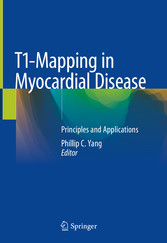Suchen und Finden
Service

T1-Mapping in Myocardial Disease - Principles and Applications
Phillip C. Yang
Verlag Springer-Verlag, 2018
ISBN 9783319911106 , 113 Seiten
Format PDF
Kopierschutz Wasserzeichen
Geräte
This book details the advances in cardiac MRI that have enabled quantitative tissue characterization of the myocardium using myocardial and blood T1 measurements, which have enabled reliable detection of diffuse pathological processes in both the cardiomyocytes and the interstitial cells of the myocardium. Evaluation of the native myocardial and interstitial fibrosis, and measurement of the extracellular volume fraction has allowed an unprecedented opportunity to elucidate the pathology, diagnosis and prognosis of cardiovascular disease.
T1-Mapping in Myocardial Disease: Principles and Applications reviews a wide spectrum of significant cardiovascular disease and provides relevant guidance for the clinical implementation of this innovative technique. The specific topics covered include principles of T1-mapping in cardiovascular disease and the role of T1-mapping in hypertensive heart disease and hypertrophic cardiomyopathy, cardiotoxicity from cancer treatment, cardiacfibrosis, left ventricular hypertrophy in aortic stenosis, peri-infarct injury in ischemic cardiomyopathy, and stem cell therapy. This comprehensive coverage of the utility of T1-mapping in cardiovascular diseases will greatly appeal to the entire cardiovascular medicine and imaging communities.
Phillip C. Yang is an Associate Professor of Medicine (Cardiovascular Medicine) at the Stanford University School of Medicine. He directs the Cellular and Molecular Imaging Lab (Yang Lab) and Stanford Cardiothoracic MRI Program. Dr. Yang received degrees from Stanford University and Yale University School of Medicine, and completed post-graduate training at UCLA and Stanford University Medical Centers. Dr. Yang is a physician-scientist whose research interest focuses on clinical translation of the fundamental molecular and cellular processes of myocardial restoration. His research employs novel in vivo multi-modality molecular and cellular imaging technology to translate the basic innovation in small molecules. Dr. Yang is currently a PI on the NIH/NHLBI funded CCTRN UM1 grant, which is designed to conduct multi-center clinical trial on novel biological therapy. In addition, he is a PI on 3 NIH research grants, 1 CIRM grant, and leads 3 stem cell clinical trials. He hopes to pioneer the Cardiovascular Regeneration Program at Stanford. Dr. Yang has been the recipient of several prestigious awards including NIH Career Development Award, NIH Career Enhancement Award, and NIH Patient Oriented Research.
Shop


